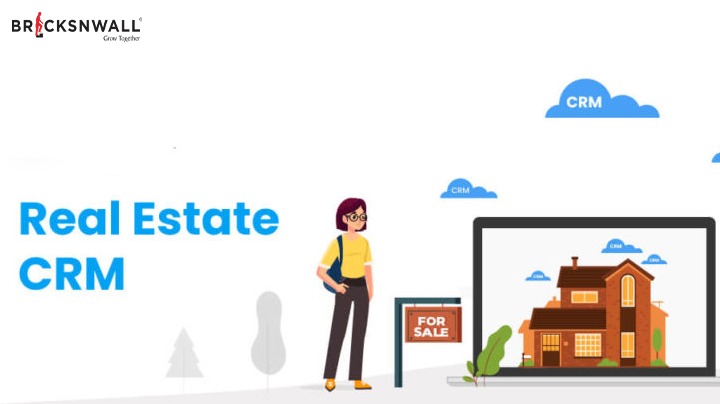What exactly is Real Estate CRM?
Bricksnwall Trusted Experts

CRM for real
estate refers to a method of consolidating all of your sales channels and
customer communication activities onto a single platform. It simplifies the
process of finding and managing customer data, sending follow-up emails,
setting reminders, and scheduling appointments. These types of tasks can be
automated to save time and energy.
Realtor CRMs
efficiently implement customer data and customer management operations. They
also enable the tracking and analysis of data using data visualization tools to
discover strengths and shortcomings. Identifying pain points is essential for
making your company more effective and lucrative in the long run.
Within the
mobile dashboard, the complete outbound sales team may check their customer
profile before visiting them, getting in touch, making notes, and arranging
future schedules. Overall, a CRM for real estate helps to improve operational
efficiency, make sales more fluid, and increase overall sales for your
firm.
These are
just a few of the ways that real estate CRM software can help you streamline
your business operations. Deals can be visualized in the sales pipeline CRM
software by real estate agents, realtors, brokers, and professionals.
Identifying and moving good deals down your sales funnel allows agents to close
transactions faster and perform better.
What
is the purpose of a Real Estate CRM?
CRM for real
estate can help enhance lead distribution between marketing and sales.
Marketing teams can use Real Estate CRMs to deliver critical information to
sales. Teams can use the application to chat with one another and save notes to
discuss crucial information. sing
Aside from
that, it provides a virtual glimpse of the sales pipeline. They also assist you
in tracking contract value and forecasting future sales estimates. This can
assist you in making key business decisions based on the information you
receive.
Real estate
CRMs significantly boost collaboration across various departments within a
firm. You can improve the flow of corporate communication by integrating sales
and marketing departments. It eliminates fragmented workplace cultures and
instead connects them.
Why
it's Important?
It is
simpler to assess how many transactions were produced and how well performance
compared to the goals set. Real estate CRM software can notify agents whether a
deal is warm, hot, or has gone cold. The agents can then utilize this
information to tailor your efforts.
Real estate
CRMs are ideal for incorporating outbound sales call functionalities. Agents
can use it to add notes to client databases, view notes from prior calls and
schedule follow-ups.
If you work
as part of a team, you must keep track of which calls are assigned to which
team members, if they were completed, and whether they were reassigned.
Choose the
best real estate CRM that allows you to interface with auto-dialing systems for
extra convenience for teams that engage in large calls. Click-to-call and
auto-logging capabilities assist realtors in saving time while enhancing
overall productivity and trackability for communicating with prospects without
having to keep track of past commitments. Gain deeper insight into conversions
and more accurate future estimates.
Deals
go through several phases in the pipeline:
Leads - The lead stage
indicates that the team has been notified of a potential sales prospect. This
is possible depending on the settings you specify in your CRM.
Contacted - This step
indicates if the prospect has already been contacted or whether the team needs
to contact the prospect by text, phone, or email.
Appointment - The lead has
reacted positively, and an appointment has been scheduled.
Follow-up - The Follow-up
stage allows team members to stay in touch with customers and warm leads
following their initial appointment.
Signed
Exclusive Brokerage - Customers are regarded to have entered this stage if
they have opted to cooperate with you in purchasing or selling a home.
Search - The search stage
indicates that the customer is collaborating with you to find a Real Estate
opportunity.
Negotiations
on Offers - This stage gives information on offers that must be accepted or
negotiated.
Under
Contract - Prospects who have agreed to buy or sell Real Estate with your
organization are in this stage.
Clear-to-Close - This step
indicates to the team that the paperwork and legal agreements have been
finalized.
Finalized - Clients must be
supplied with closing information and required paperwork at this stage. This is
the pipeline's final stage.
A CRM is required if you are a medium to large-sized real estate agency generating leads online and wish to automate various marketing operations.




